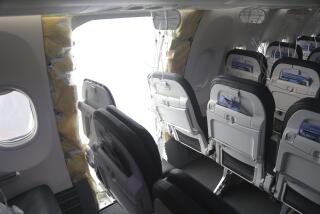Raid Shows Seriousness of Parts Probe At Northrop : Defense: Federal agents seized parts right off the F/A-18 assembly line. But the Navy says the planes are safe.
- Share via
When a squad of federal agents stormed the Northrop F/A-18 plant in El Segundo on Tuesday, they went straight for the assembly line, removing allegedly defective parts from the jet fighters while the planes were being produced.
The extraordinary raid--possibly the first time that law enforcement officers have confiscated evidence directly from an aircraft production line--reflected the seriousness of the allegations that the F/A-18s contained flawed components.
The critical parts in question include metal and plastic tubing in the aircraft’s hydraulic, fuel and pressurization systems, according to sources close to the investigation. The tubing allegedly failed to meet strict military specifications, though Navy officials said Wednesday that they do not believe existing F/A-18s are unsafe to fly.
The tubing is supposed to be precisely formed and shaped, but the tubes supplied to the F/A-18 line often failed to fit, investigators said. In some cases, the tubing was bent or otherwise forced into position, leading to concern that it might not withstand internal pressures during operation.
“The Naval Air Systems Command has made a thorough review of the system and has determined there is no safety-of-flight issue,” insisted Navy spokesman Lt. Dave Wray.
He added that the hydraulic system, which operates at the highest pressures of the three systems, has two backup systems in the event of failure. Northrop formed and installed the backup tubing as well, but officials said it is unlikely that all three could fail.
“Our big concern is whether this tubing is going to hold when a pilot pulls a big left-hand turn” at five times the force of gravity, said a federal agent who asked not to be named. “If all three systems fail, God doesn’t want you to live anyway.”
Nonetheless, Navy officials were continuing to study the matter. So far, the F/A-18s in the Navy fleet are being flown as usual, Wray said.
Northrop is continuing normal production, said company spokesman Tony Cantafio. Another spokesman, Ron Owens, said the company is not commenting beyond an earlier statement that it is “working with the government to understand the issues.”
Northrop produces the aft and center fuselage sections of the F/A-18, representing about 40% of the content of the aircraft. McDonnell Douglas assembles the aircraft in St. Louis. Last year, Northrop delivered 101 F/A-18 fuselages, and plans to deliver 94 this year. It is the company’s largest program after the B-2 Stealth bomber.
The allegations were originally made by Northrop employees, who have filed a case under the federal False Claims Act, which allows individuals to sue on behalf of the government and share in any damages. The individuals are represented by Claremont attorney Herbert Hafif, who said he could not identify them “in order to preclude the threat of retaliation.”
An internal “fact paper” from the Naval Investigative Command said the probe “concerns allegations of product substitution, false certifications and possible cost mischarging.”
“Product substitution” refers to allegedly defective tubing. “False certifications” refers to whether Northrop tried to cover up the tubing problems with falsified testing and improper certifications to the government.
“We believe the certification process is faulty for meeting mil specs (military specifications),” the source said. “Our argument is, they ran the tubing through, it didn’t meet the specs, so they fudged with the computer to show that it met them.”
The “possible cost mischarging” allegation is based on the supposition that if Northrop supplied defective parts, then the government did not get what it paid for and was overcharged as a result.
Federal agents reported that Northrop officials had not been cooperative with the investigators, but Cantafio rebutted that assertion.
The federal agents complained that Northrop officials brought a team of company lawyers to each plant and ordered employees not to talk to the federal agents and refused to allow employees to assist the agents in selecting the right documents and computer material.
“They basically said, ‘You boys figure it out,’ ” according to the source.
As a result, the agents are reported to have seized a huge amount of documentation and computer tapes, since they were not sure exactly what they were looking for. Rather than select documents from a drawer, they simply took the entire drawer.
But Cantafio said that calling in lawyers hardly represents a non-cooperative response. “If you got a search warrant, what is the first thing you would do? You’d call your lawyer,” he said.
More to Read
Inside the business of entertainment
The Wide Shot brings you news, analysis and insights on everything from streaming wars to production — and what it all means for the future.
You may occasionally receive promotional content from the Los Angeles Times.











